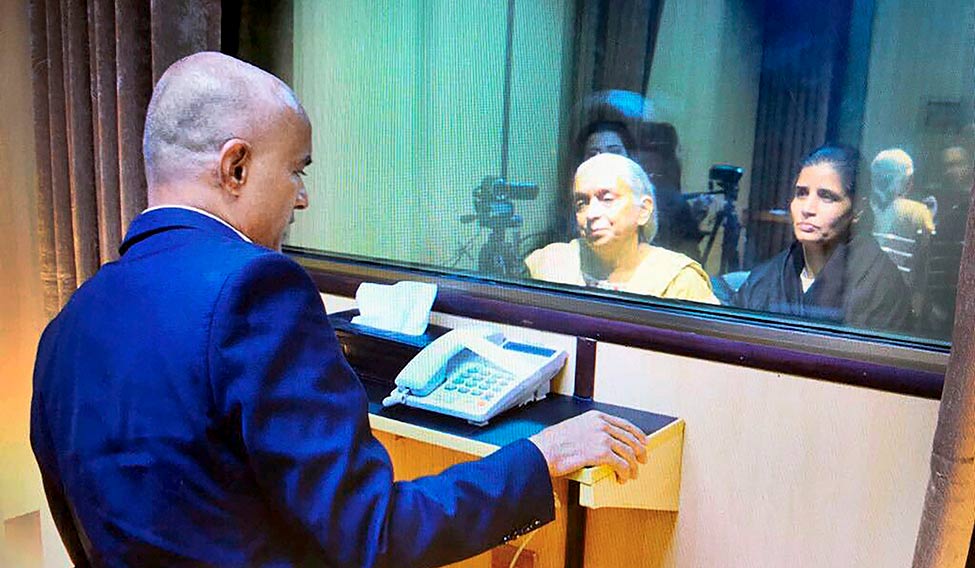In a major diplomatic win for India, the International Court of Justice (ICJ) on Wednesday directed Pakistan to review the death sentence of former Navy officer Kulbhushan Jadhav, on charges of "espionage and terrorism".
Affirming Jadhav's right to consular access and notification, the world court said, his death sentence should remain suspended until Pakistan “effectively” reviews and reconsiders the conviction and sentence in light of Pakistan’s breach of Art 36(1), i.e. denial of consular access and notification.
The bench, led by President of the Court Judge Abdulqawi Ahmed Yusuf, also ruled by 15 votes to 1 that Pakistan had violated India's rights to consular visits after Jadhav's arrest.
And the decision in the #Jadhav Cade is out!
— Reema Omer (@reema_omer) July 17, 2019
ICJ has ruled in favour of India on merits, affirming Jadhav’s right to consular access and notification
The Court has directed Pakistan to provide effective review and reconsideration of his conviction and sentences pic.twitter.com/DE3dAb9eIv
The court, however, rejected India's requests, including annulment of military court conviction, his release and safe passage to India.
Pakistan "deprived the Republic of India of the right to communicate with and have access to Mr Kulbhushan Sudhir Jadhav, to visit him in detention and to arrange for his legal representation", the judges said.
The bench observed that there was a three-week delay in informing India about Jadhav's arrest on March 3, 2016, leading to a "breach" of Pakistan's obligations under the convention.
Also read
- Who was Mufti Shah Mir? How Pak scholar who helped ISI abduct Kulbhushan Jadhav was killed by unidentified gunmen
- Will Harish Salve come again to defend Kulbhushan Jadhav?
- Kulbhushan Jadhav should be represented by Indian lawyer: MEA tells Pakistan
- No communication from Pakistan on Kulbhushan Jadhav case: MEA
- Pak court appoints three senior lawyers as amici curiae in Jadhav's case
Noting that India has made a number of requests for the consular access, which was denied by Pakistan, the court said it was "undisputed" fact that Pakistan did not accede to India's appeals.
Jadhav, 49, a retired Indian Navy officer, was sentenced to death by the Pakistani military court on charges of "espionage and terrorism" after a closed trial in April 2017. His sentencing evoked a sharp reaction in India.
The verdict in the high-profile case comes nearly five months after a 15-member bench of ICJ led by Judge Yusuf had reserved its decision on February 21 after hearing oral submissions by India and Pakistan. The proceedings of the case took two years and two months to complete.
India moved the ICJ in May 8, 2017 for the "egregious violation" of the provisions of the Vienna Convention by Pakistan by repeatedly denying New Delhi consular access to Jadhav.
A bench of the ICJ, which was set up after World War II to resolve international disputes, on May 18, 2017 had restrained Pakistan from executing Jadhav till adjudication of the case.
A four-day public hearing in the high-profile case took place in February amidst heightened tensions between India and Pakistan following one of the worst terror attacks in Jammu and Kashmir by Pakistan-based Jaish-e-Mohammed terror group that killed 40 CRPF soldiers on February 14.
During the hearing in ICJ, both India and Pakistan submitted their detailed pleas and responses.
India based its case on two broad issues—breach of Vienna Convention on consular access and the process of resolution.
Harish Salve, who was representing India in the case, questioned the functioning of Pakistan's notorious military courts and urged the top UN court to annul Jadhav's death sentence, which is based on an "extracted confession".
In his submission in the ICJ on the last day of the hearing, Pakistan's counsel Khawar Qureshi said, "India's claim for relief must be dismissed or declared inadmissible."
Pakistan claims that its security forces arrested Jadhav from restive Balochistan province on March 3, 2016 after he reportedly entered from Iran.
However, India maintains that Jadhav was kidnapped from Iran where he had business interests after retiring from the Navy.
Pakistan had rejected India's plea for consular access to Jadhav at the ICJ, claiming that New Delhi wants the access to get the information gathered by its "spy".
However, Pakistan facilitated a meeting of Jadhav with his mother and wife in Islamabad on December 25, 2017.
With inputs from PTI



